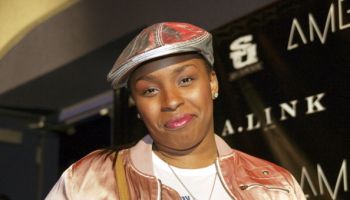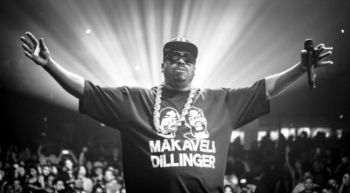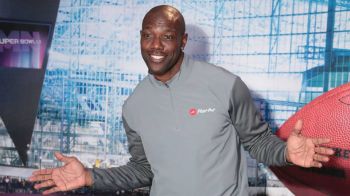Soledad O’Brien Talks to Black Voices About ‘Almighty Debt: A Black In America Special’
By Alexis Stodghill on Oct 20th 2010 10:19PM
Filed under: News, The Economy
Ms. O’Brien took a few minutes out of her busy schedule, which has included hosting live discussions in major cities about African American debt, to talk with Black Voices about this amazing enterprise.
What inspired you to tackle the issue of debt in black America and tie it to the ways in which black churches address both the material and spiritual needs of their members?
We were very interested in looking at the black church for our third ‘Black in America,’ because it’s such an important and huge institution in the black community, so that made sense. It wasn’t until we really narrowed it down and found the pastor and the church we would focus on, Pastor Buster Soaries and his church in central New Jersey, that we knew that our topic would be debt. He was just so obsessed, frankly, he was so focused on talking about the gap between black wealth and white wealth. So it seemed to be an important and relevant topic at a time when we are in a terrible recession that is terrible for everybody, but devastating for African Americans. Plus, I think for Pastor Soaries, it was a real extension of the work that he had done on the civil rights agenda since he was a teenager. That for us was a real metaphor for how black churches not only continue to stay relevant but are also moving out of the civil rights agenda of the past and moving into a new agenda in terms of figuring out how to navigate finances for black people.
Pastor Soaries, leader of the church that you chronicle in ‘Almighty Debt: A Black In America Special,’ thinks that debt is a worse problem than racism for the African American community.
I think he is being over the top. He’s trying to be provocative. I think he’s trying to make a statement. Because he and I have been on a lot of panels now, I know that he has said racism is something that is external and debt is something that is internal and that you can control. You have influence over that. One of the examples that [Pastor Soaries] has given many times now is Frederick Douglass. Racism was definitely much more intense and debilitating during Frederick Douglass’ time, and yet you have a guy who, in spite of the fact that it was illegal to teach a slave to read, learned to read. He was much more focused on what he was going to get, as opposed to everyone around him who wouldn’t allow him to read. I think that’s the point [Pastor Soaries] is trying to make. You have an opportunity when it comes to debt to change your life. You could be waiting a long time if you want to wait for racism as a whole to be eradicated.
Through focusing on Pastor Soaries’ church, you take people into the lives of some of his members who are struggling financially. What was the most moving moment for you as you watched them deal with difficult circumstances?
I think for each one it was a little bit different. For Fred Phillips, it was to see him grow and become such a thoughtful young man. In the middle of the documentary I said to him, “So, how did you turn out the way you did?” He was so poetic, and I thought profound, when he said: “I don’t want to be poor like my mother. I’m learning from other people’s mistakes. I’m learning from their choices. That’s how I’m making my choices.” That’s an amazingly powerful thing for a seventeen-year-old kid who hasn’t had much life experience to say. I think for the Jeffries it’s watching them try to figure out how to navigate the pain that Mrs. Jeffries feels about having lost her daughter to today, when they are trying to figure out if they are going to lose their home. That was a tough thing to watch, and yet I feel very hopeful about what their opportunities are. And certainly when it comes to Carl Fields and his wife, when Carl says “It makes me feel less than a man to watch my wife go off to work and I’m in the bed” — that’s a powerful and sad thing to hear somebody say. Work isn’t just about the money. Work is a foundation of how you feel about who you are, and if you aren’t working that’s devastating on a bunch of levels. So I think that for each of them, to be so open and honest at a time when it’s embarrassing and hard because they are all carrying big loads, I thought that was pretty amazing.
There were mixed reactions to the first ‘Black in America’ documentary. What has been the reaction so far from those who have pre-screened this installment?
I think that there have been great reactions. People seem to really be embracing it. Every documentary I have done so far has had mixed reactions. Some people love it, some people hate it. My own mother about the first ‘Black in America’ said, “Oh, No Afro-Cubans. Huh. Your own people – couldn’t make it into the documentary.” (Laughs.)
The goal of ‘Black in America,’ and all our ‘In America’ documentaries, is to spur conversation, to be thoughtful, to be timely and to push people into conversations that are sometimes uncomfortable. It’s not about a popularity contest in which I hope everybody feels really good about the material. It’s not about that. We do news documentaries which [means] wherever our characters take us, that is where we go. We do not flinch from uncomfortable conversations. My goal is that people will be having these conversations that are important and relevant about things that don’t get talked about a lot.
Related:
+From The BVX — Exclusive Preview: CNN’s ‘Black in America’ to Tackle Debt Crisis
+CNN’s ‘Almighty Debt’: Exploring Black People Once Again Tomorrow Night
You have invited members of the black press and other black religious leaders, such as Pastors T.D. Jakes and Floyd Flake, to continue the discussion that your documentary has started. What do you hope will be the outcome of spurring a wider discussion of debt for blacks?
People have said at every one of these [live panel] events that we’ve held – not really to me, more to Pastor Soaries and [other prominent pastors in attendance such as Pastor Floyd Flake] – you know, you should take this on the road. You should take this story further. And you know, I hope that will happen. Pastor Soaries has written a book, which I think comes out in the first quarter of 2011, which explains “Here’s how we did it,” because we get so many requests. And I think that’s brilliant. I think that if they’re smart they will move it out of the realm of Pastor Soaries’ rather large church, because clearly it’s a national message. It needs to be bigger than just his church.
What do you hope people of other races will take away from viewing ‘Almighty Debt’? Can you see the documentary helping to increase racial understanding?
You know, that’s never really my goal. My goal is to tell honest stories about people. I don’t have a goal like “I hope people understand black people in America better,” or when we do ‘Gay in America,’ “I hope people understand gay people better.” I don’t ever dictate what I think people will get out of anything that I do. My goal is to be true to the story, and true to the material and true to the people, to tell their stories with integrity, honesty, and factual accuracy.
I think that if you’ve done a good job and you’ve told a good story, then people will like that good story. Then it won’t matter if the main characters are black and Baptist, or white and Catholic, or Asian and Pentecostal. The question should be, “Is it a compelling story told with interesting characters that draw you in over the two hours of the documentary?”
And I think we’ve done it. We always set a high bar and I think we’ve done it. Whenever we report on stories like Hurricane Katrina or Haiti, it’s always about: “Is it a compelling story about Haitian orphans? Do people want to watch?” We don’t expect people to say “Well, I’m not Haitian, so maybe this story is not for me.”
It’s really about whether it is well told. That’s really what I focus on, the storytelling.
To find out what happens in the lives of Fred Phillips and the Fields and Jeffries families, please watch ‘Almighty Debt: A Black In America Special,’ which airs on Thursday, October 21 at 9pm on CNN.














